SQL Comparison operator
Comparison operator
A comparison (or relational) operator is a mathematical symbol which is used to compare two values.
Comparison operators are used in conditions that compares one expression with another. The result of a comparison can be TRUE, FALSE, or UNKNOWN (an operator that has one or two NULL expressions returns UNKNOWN).
The following table describes different types of comparison operators -
| Operator | Description | Operates on |
|---|---|---|
| = | Equal to. | Any compatible data types |
| > | Greater than. | Any compatible data types |
| < | Less than. | Any compatible data types |
| >= | Greater than equal to. | Any compatible data types |
| <= | Less than equal to. | Any compatible data types |
| <> | Not equal to. | Any compatible data types |
Syntax :
SELECT[column_name| * |expression]<comparison operator> [column_name | * | expression ] FROM <table_name> WHERE <expression>[comparison operator]<expression>;
Parameters:
| Name | Description |
|---|---|
| column_name | Name of the column of a table. |
| * | Indicates all the columns of a table. |
| expression | Expression made up of a single constant, variable, scalar function, or column name and can also be the pieces of a SQL query that compare values against other values or perform arithmetic calculations. |
| table_name | Name of the table. |
| comparison operator | Equal to (=), not equal to(<>), greater than(>), less than(<), greater than or equal to (>=), less than or equal to (<=). |
Contents:
Example: SQL Comparison operator
To get a comparison between two numbers from the DUAL table, the following SQL statement can be used :
SELECT 15>14 FROM dual;
Explanation:
- SELECT: This keyword is used to retrieve data from a database.
- 15>14: This is a boolean expression that evaluates to true (1 in SQL) because 15 is greater than 14.
- FROM dual: The dual table is a special one-row, one-column table in Oracle database. It's commonly used in SQL queries to perform calculations or evaluate expressions. In this case, it's used to execute the boolean expression 15>14 and return the result.
SQL Equal to ( = ) operator
The equal to operator is used for equality test within two numbers or expressions.
Example:
Sample table : agents+------------+----------------------+--------------------+------------+-----------------+---------+ | AGENT_CODE | AGENT_NAME | WORKING_AREA | COMMISSION | PHONE_NO | COUNTRY | +------------+----------------------+--------------------+------------+-----------------+---------+ | A007 | Ramasundar | Bangalore | 0.15 | 077-25814763 | | | A003 | Alex | London | 0.13 | 075-12458969 | | | A008 | Alford | New York | 0.12 | 044-25874365 | | | A011 | Ravi Kumar | Bangalore | 0.15 | 077-45625874 | | | A010 | Santakumar | Chennai | 0.14 | 007-22388644 | | | A012 | Lucida | San Jose | 0.12 | 044-52981425 | | | A005 | Anderson | Brisban | 0.13 | 045-21447739 | | | A001 | Subbarao | Bangalore | 0.14 | 077-12346674 | | | A002 | Mukesh | Mumbai | 0.11 | 029-12358964 | | ......... | A009 | Benjamin | Hampshair | 0.11 | 008-22536178 | | +------------+----------------------+--------------------+------------+-----------------+---------+
To get data of all columns from the 'agents' table with the following condition -
1. 'commission' is equal to .15,
the following SQL statement can be used :
SQL Code:
SELECT * -- Select all columns
FROM agents -- From the table named "agents"
WHERE commission = 0.15; -- Where the value in the column "commission" is equal to 0.15
Explanation:
- SELECT *: This specifies that we want to retrieve all columns from the table.
- FROM agents: This indicates the table from which we want to retrieve the data. In this case, the table is named "agents".
- WHERE commission = 0.15: This is a conditional clause that filters the rows returned by the query. It specifies that only rows where the value in the "commission" column is equal to 0.15 should be included in the result set.
Output:
AGENT_ AGENT_NAME WORKING_AREA COMMISSION PHONE_NO COUNTRY ------ ------------------------------ ----------------- ---------- --------------- -------- A007 Ramasundar Bangalore .15 077-25814763 A011 Ravi Kumar Bangalore .15 077-45625874 A006 McDen London .15 078-22255588 A004 Ivan Torento .15 008-22544166
Relational Algebra Expression:

Relational Algebra Tree:
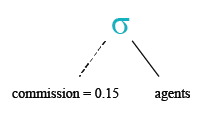
SQL Greater than ( > ) operator
The greater than operator is used to test whether an expression (or number) is greater than another one.
Example:
To get data of all columns from the 'agents' table with the following condition -
1. 'commission' is greater than .14,
the following SQL statement can be used :
SQL Code:
SELECT * -- Select all columns
FROM agents -- From the table named "agents"
WHERE commission > 0.14; -- Where the value in the column "commission" is greater than 0.14
Explanation:
- SELECT *: This specifies that we want to retrieve all columns from the table.
- FROM agents: This indicates the table from which we want to retrieve the data. In this case, the table is named "agents".
- WHERE commission > 0.14: This is a conditional clause that filters the rows returned by the query. It specifies that only rows where the value in the "commission" column is greater than 0.14 should be included in the result set.
Output:
AGENT_ AGENT_NAME WORKING_AREA COMMISSION PHONE_NO COUNTRY ------ -------------- ----------------------------------- ---------- --------------- ------- A007 Ramasundar Bangalore .15 077-25814763 A011 Ravi Kumar Bangalore .15 077-45625874 A006 McDen London .15 078-22255588 A004 Ivan Torento .15 008-22544166
Relational Algebra Expression:

Relational Algebra Tree:
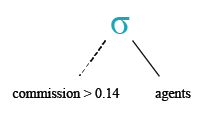
SQL Less than ( < ) operator
The less than operator is used to test whether an expression (or number) is less than another one.
Example:To get data of all columns from the 'agents' table with the following condition -
1. 'commission' is less than .12,
the following SQL statement can be used :
SQL Code:
SELECT * -- Select all columns
FROM agents -- From the table named "agents"
WHERE commission < 0.12; -- Where the value in the column "commission" is less than 0.12
Explanation:
- SELECT *: This specifies that we want to retrieve all columns from the table.
- FROM agents: This indicates the table from which we want to retrieve the data. In this case, the table is named "agents".
- WHERE commission < 0.12: This is a conditional clause that filters the rows returned by the query. It specifies that only rows where the value in the "commission" column is less than 0.12 should be included in the result set.
Output:
AGENT_ AGENT_NAME WORKING_AREA COMMISSION PHONE_NO COUNTRY ------ -------------- ----------------------------------- ---------- --------------- --------- A009 Benjamin Hampshair .11 008-22536178 A002 Mukesh Mumbai .11 029-12358964
Relational Algebra Expression:

Relational Algebra Tree:
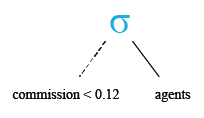
SQL Greater than or equal to ( >= ) operator
The greater than equal to operator is used to test whether an expression (or number) is either greater than or equal to another one.
Example:
To get data of all columns from the 'agents' table with the following condition -
1. 'commission' is greater than or equal to .14,
the following SQL statement can be used :
SQL Code:
SELECT * -- Select all columns
FROM agents -- From the table named "agents"
WHERE commission >= 0.14; -- Where the value in the column "commission" is greater than or equal to 0.14
Explanation:
- SELECT *: This specifies that we want to retrieve all columns from the table.
- FROM agents: This indicates the table from which we want to retrieve the data. In this case, the table is named "agents".
- WHERE commission >= 0.14: This is a conditional clause that filters the rows returned by the query. It specifies that only rows where the value in the "commission" column is greater than or equal to 0.14 should be included in the result set.
Output:
AGENT_ AGENT_NAME WORKING_AREA COMMISSION PHONE_NO COUNTRY ------ --------------- ----------------------------------- ---------- --------------- -------- A001 Subbarao Bangalore .14 077-12346674 A007 Ramasundar Bangalore .15 077-25814763 A011 Ravi Kumar Bangalore .15 077-45625874 A010 Santakumar Chennai .14 007-22388644 A006 McDen London .15 078-22255588 A004 Ivan Torento .15 008-22544166
Relational Algebra Expression:

Relational Algebra Tree:
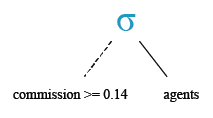
SQL Less than or equal to ( <= ) operator
The less than equal to operator is used to test whether an expression (or number) is either less than or equal to another one.
Example:
To get data of all columns from the 'agents' table with the following condition -
1. commission is less than or equal to .12,
the following SQL statement can be used :
SQL Code:
SELECT * -- Select all columns
FROM agents -- From the table named "agents"
WHERE commission <= 0.12; -- Where the value in the column "commission" is less than or equal to 0.12
Explanation:
- SELECT *: This specifies that we want to retrieve all columns from the table.
- FROM agents: This indicates the table from which we want to retrieve the data. In this case, the table is named "agents".
- WHERE commission <= 0.12: This is a conditional clause that filters the rows returned by the query. It specifies that only rows where the value in the "commission" column is less than or equal to 0.12 should be included in the result set.
Output:
AGENT_ AGENT_NAME WORKING_AREA COMMISSION PHONE_NO COUNTRY ------ --------------- ---------------------------------- ---------- --------------- --------- A009 Benjamin Hampshair .11 008-22536178 A008 Alford New York .12 044-25874365 A012 Lucida San Jose .12 044-52981425 A002 Mukesh Mumbai .11 029-12358964
Relational Algebra Expression:

Relational Algebra Tree:
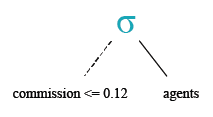
SQL Not equal to ( <> ) operator
The not equal to operator is used for inequality test between two numbers or expression.
Example:To get data of all columns from the 'agents' table with the following condition -
1. commission is not equal to .15,
the following SQL statement can be used :
SQL Code:
SELECT * -- Select all columns
FROM agents -- From the table named "agents"
WHERE commission <> 0.15; -- Where the value in the column "commission" is not equal to 0.15
Explanation:
- SELECT *: This specifies that we want to retrieve all columns from the table.
- FROM agents: This indicates the table from which we want to retrieve the data. In this case, the table is named "agents".
- WHERE commission <> 0.15: This is a conditional clause that filters the rows returned by the query. It specifies that only rows where the value in the "commission" column is not equal to 0.15 should be included in the result set.
Output:
AGENT_ AGENT_NAME WORKING_AREA COMMISSION PHONE_NO COUNTRY ------ ------------- ----------------------------------- ---------- --------------- -------- A003 Alex London .13 075-12458969 A001 Subbarao Bangalore .14 077-12346674 A009 Benjamin Hampshair .11 008-22536178 A008 Alford New York .12 044-25874365 A010 Santakumar Chennai .14 007-22388644 A012 Lucida San Jose .12 044-52981425 A005 Anderson Brisban .13 045-21447739 A002 Mukesh Mumbai .11 029-12358964
Relational Algebra Expression:

Relational Algebra Tree:
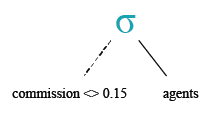
Check out our 1000+ SQL Exercises with solution and explanation to improve your skills.
PREV : SQL Arithmetic Operators
NEXT : SQL Logical Operators
